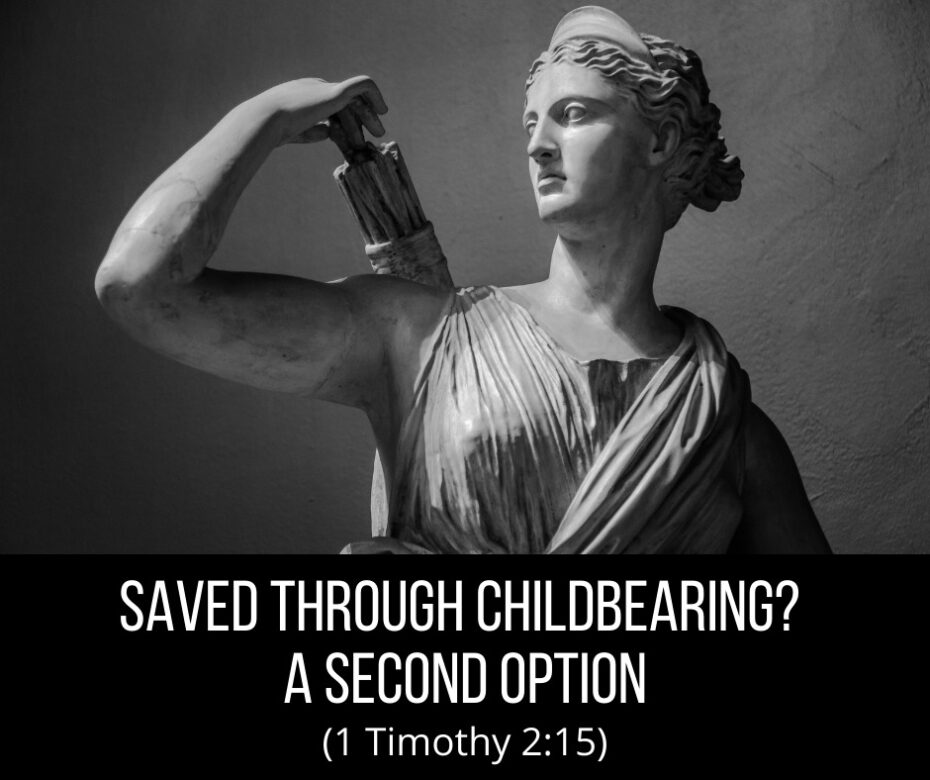In 1 Timothy, Paul wrote:
Nevertheless she will be saved in childbearing if they continue in faith, love, and holiness, with self-control (1 Tim 2:15).
Was Paul denying justification by faith apart from works? Do women have two conditions to be eternally saved, i.e., faith plus having children?
That can’t be.
Scripture is too clear that the one and only condition to be eternally saved is to believe in Jesus for eternal salvation (see here). So what could Paul mean?
One option is that Paul meant women could be saved from the frustration of not being able to teach during the meeting of the church by having children. How? Because they could teach their children about Christ, and so long as “they”—the children—actually believed and continued in the faith, the women would be saved from the frustration of having to be silent (see the argument here).
However, I recently came across a second option, one that interprets Paul in light of the situation in Ephesus, where Timothy was staying (cf. 1 Tim 1:3).
As you may know, the life and economy of Ephesus centered around the goddess Artemis, also known as Diana. The Temple of Artemis was considered one of the Seven Wonders of the Ancient World. Frank Ames sees several indications that in 1 Timothy, Paul was addressing Artemisian worship practices.
For example, Artemis was known as Phosphorous or “light-bearer,” but Paul told Timothy that only God lives “in unapproachable light” (1 Tim 6:16).
In Ephesus, women prayed to Artemis, while wearing elaborate clothing and braided hair. By contrast, Paul urged the women to pray while dressed modestly, without braids (1 Tim 2:9).
Artemis was the goddess of the hunt and played a significant role in the Trojan War, so that men prayed to her for help in battle. But Paul instructed the Christian men to pray for peace (1 Tim 2:1-2).
Men prayed to Artemis with hands “slightly above waist level with palms turned upward.” By contrast, Paul wanted men to pray with hands raised up (1 Tim 2:8).
But most of all, women looked to Artemis for protection during labor. And that may be the specific belief that Paul was addressing in 1 Tim 2:15:
The promise of being “saved through child-bearing” (2:15) counters Ephesian belief that Artemis was the goddess who protected women in labor. Interpretations of (2:15) concluding that it refers to a life of caring for children or to the birth of Jesus are simply unaware of the social context of the Ephesian people, or the mortality rates and concerns of ancient women. The promise directly confronts reliance upon the protection of Artemis. Fearing death during the dangers of labor, women throughout the ancient world and particularly in cities with shrines to Artemis turned to her for safekeeping. Artemis was a perpetual virgin who discouraged marriage and often punished pregnant women at the time of delivery by inflicting death (Frank Ames, “The Ephesian Social World Providing the Backdrop for Paul’s Teaching in 1 Timothy”).
In other words, instead of relying on Artemis, Paul called the Ephesian women to depend upon Jesus to save them through childbearing.
I don’t know if Ames is on target here, but I do think it’s worth hunting for more evidence.


